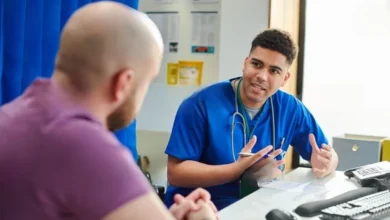Exploring the Benefits of the Graston Technique for Muscle Recovery Post-MVA

Recovering from a (MVA) motor vehicle accident can be a long, painful process, especially when muscles and soft tissues are damaged. This is where specialized treatments like the Graston Technique come in, offering significant benefits in motor vehicle accidents. Motor vehicle accident physiotherapy in Sherwood Park offers an innovative mobilization method that is increasingly acknowledged for accelerating recovery and enhancing overall outcomes. This non-invasive therapy enhances the healing process and restores function by effectively addressing soft tissue injuries.
What is the Graston Technique?
It is a form of manual therapy that uses specialized stainless steel instruments to identify and address areas of soft tissue injury. Initially developed for athletes, this method is now widely used in various rehabilitation settings, including MVA physiotherapy, to treat injuries like sprains, strains, and scar tissue.
This technique works by targeting adhesions—bands of scar tissue that can form after an injury—breaking them down and allowing the body to heal more effectively. The tools are designed to glide over the skin, applying pressure to specific areas where the tissue feels restricted or tight, helping release tension and improve mobility.
How Does the Graston Technique Benefit Post-MVA Recovery?
After a motor vehicle accident, the body undergoes significant trauma, even if the injuries don’t seem severe at first. Muscles, tendons, and ligaments can sustain strains or damage, leading to pain, stiffness, and limited range of motion. The Graston Technique can offer several benefits for those undergoing car accidents:
1. Speeds Up the Healing Process
One of the most significant benefits of the Graston Technique is its ability to accelerate recovery. By breaking up scar tissue and enhancing blood flow to injured areas, the technique promotes faster healing. This is particularly useful in MVA physiotherapy, where quicker recovery means patients can regain function and return to daily activities sooner.
2. Reduces Pain and Inflammation
Pain management is a critical component of car accident physiotherapy. Many patients report a reduction in pain and inflammation after undergoing Graston treatments. The technique helps to decrease chronic inflammation by improving circulation and reducing the buildup of scar tissue, which is often a major source of discomfort post-MVA.
3. Improves Range of Motion
Following an MVA, stiffness in the muscles and joints can severely limit movement. The Graston Technique improves flexibility by targeting the connective tissues responsible for restricting motion. By breaking down adhesions and promoting collagen production, patients often experience improved mobility, which is crucial for resuming everyday activities.
4. Non-Invasive Alternative to Surgery
For many, the idea of surgery to repair soft tissue damage can be daunting. Fortunately, the Graston Technique offers a non-invasive option for treating muscle and tissue injuries. This makes it an attractive option in car accident physiotherapy, particularly for those who wish to avoid surgical interventions. The technique offers a safe and efficient alternative that can yield significant improvements without the risks associated with invasive procedures.
5. Targets Chronic and Acute Conditions
Whether the injury is recent or an older, lingering issue, the Graston Technique can effectively address both acute and chronic conditions. After an MVA, some injuries may not show immediate symptoms but develop over time into chronic problems. Motor vehicle accident physiotherapy in Sherwood Park ensures that even long-standing tissue damage can be treated, making it a comprehensive approach to MVA physiotherapy.
How the Graston Technique is Integrated Into MVA Physiotherapy
The integration of the Graston Technique into motor vehicle accident physiotherapy varies depending on the severity and type of injury. Typically, it complements other physiotherapy treatments like exercise therapy, massage, and manual stretching. Here’s a general look at how it fits into the broader MVA physiotherapy treatment plan:
1. Initial Assessment
During the first session, a physiotherapist will assess the injury and determine whether the Graston Technique is suitable. This assessment may include a physical examination and a review of the patient’s medical history, especially related to the motor vehicle accident.
2. Targeted Treatment
Once it’s clear that Graston is appropriate, the physiotherapist will use the instruments to identify areas of tightness or restriction. Treatment sessions typically last about 10 to 15 minutes and are often followed by other therapeutic exercises to support recovery.
3. Continued Rehabilitation
As the patient progresses through MVA physiotherapy, the Graston Technique can be used intermittently to address ongoing tissue issues, reduce pain, and improve function. The frequency of treatment depends on the individual’s response to therapy, but many patients notice improvements after just a few sessions.
Why Choose Graston Technique for MVA Physiotherapy?
There are several reasons why those recovering from motor vehicle accidents might choose to incorporate the Graston Technique into their physiotherapy program. For one, it offers a specialized approach to treating soft tissue injuries, which are common after car accidents. The technique also integrates seamlessly with other therapeutic modalities, enhancing the overall effectiveness of motor vehicle accident physiotherapy. Additionally, it’s non-invasive, making it an appealing choice for those seeking alternatives to more intensive treatments like surgery.
Read also: Top Health Benefits of Hass Avocado You Need to Know
A Better Path to Recovery with the Graston Technique:
Recovering from an MVA can be physically and emotionally challenging, but innovative treatments like the Graston Technique offer hope for faster, more effective recovery. Whether dealing with acute pain or lingering issues from an older accident, motor vehicle accident physiotherapy in Sherwood Park provides an evidence-based solution to improving muscle function, reducing pain, and speeding up the healing process.
Emerald Hills Physiotherapy in Sherwood Park provides a beacon of hope, leveraging techniques like the Graston Technique to help patients reclaim their health and mobility. This approach to MVA physiotherapy ensures that recovery is not only possible but also more manageable and effective.





